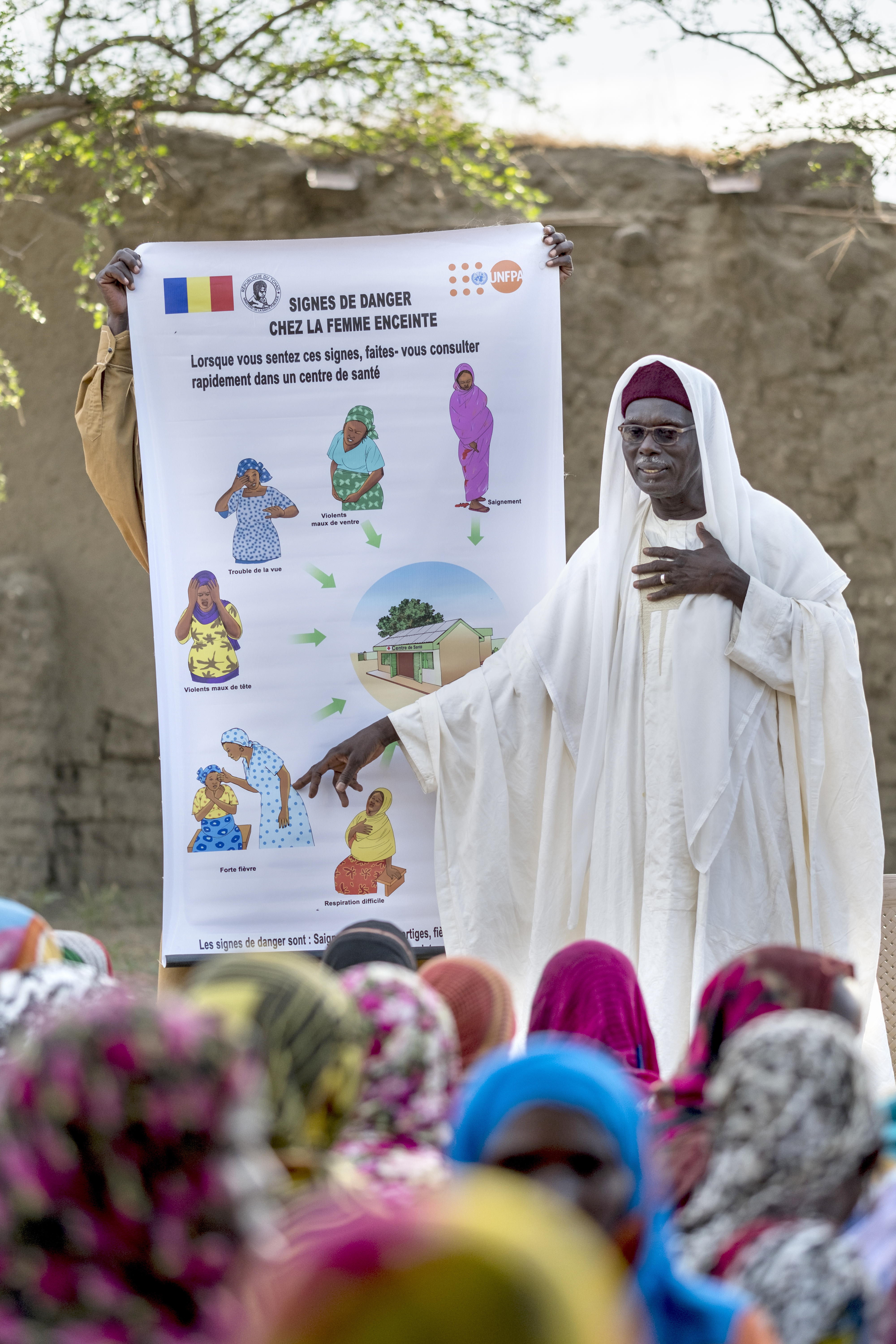 Promotion of Family Planning by Muslim Religious Leaders
The role of Muslim religious leaders in addressing family planning, reproductive health, and child marriage
Promotion of Family Planning by Muslim Religious Leaders
The role of Muslim religious leaders in addressing family planning, reproductive health, and child marriage

Challenges
Chad is one of the least developed countries in the world and has a high fertility rate of 6.4 children per woman. This, in part, is attributed to low use of modern contraception, early marriage and early entry into fertile life and the persistence of traditional and socio-cultural practices and beliefs where a large number of children is valued.
Fertility control is perceived by the majority of the population to be incompatible with Islamic principles. The misunderstanding of religious texts has been an obstacle to the practice of family planning. In close partnership with the supreme body of the Muslim community, the High Council for Islamic Affairs (referred to as the Council), UNFPA mobilised religious and traditional leaders to raise awareness and promote behaviour change with regards to family planning and reproductive health.
Towards a Solution
Through the South-South cooperation modality, the Council, with UNFPA support, has built the capacity of its members, including the League of Women Preachers, on issues relating to family well-being and reproductive health from the standpoint of Islam. Through annual study tours, Council members went through rigorous training in Indonesia. They had also benefited from sharing of experiences with Bangladesh, Egypt and Morocco. Moreover, the Council created a network of Qur’anic schools and trained at least 600 imams with whom they worked closely on the ground.
Results
To counter the misinterpretation of religious texts related to family planning, the Council conducted campaigns to raise awareness on the benefits of family planning and reproductive health and the detrimental consequences of child marriage, among others. This was done through its radio broadcast network. The imams also delivered the same messages in mosques during the Friday prayers.
The Council organized a forum on “Islam, Family Well-Being and Demographic Dividend” that involved more than 2,000 religious leaders and technical experts from the various regions of Chad and 20 countries in West and Central Africa, the Arab States and Asia. A "Declaration of N'Djamena" was issued, which stated that the spacing of births is prescribed by the Qur’an and is an important element for the family wellbeing.
Within the health centre located inside the main mosque of N’Djamena, Chad’s capital city, the Council opened a unit that specifically offered family planning services. There is evidence that the number of new acceptors of modern contraceptive methods is growing. On average, every year since 2016, more than 1,000 women adopt modern methods. Moreover, some 3,000 women preachers were committed to engage and train other women in promoting family planning and reproductive health.
Lessons Learned
The involvement of religious leaders in the promotion of family planning in predominantly Muslim communities is vital in the understanding of the religious scriptures that have implications in the practice of family planning. Advocacy of religious leaders must be in collaboration with other civil society actor and government officials.
Contact Information
Countries involved
Supported by
Implementing Entities
Project Status
Project Period
Primary SDG
Secondary SDGs
Similar Solutions
| NAME OF SOLUTION | Countries | SDG | Project Status | |
|---|---|---|---|---|
A Billion Brains: Smarter Children, Healthier Economies High Level Meeting on South-South Cooperation for Child Rights |
Chad, Egypt, Indonesia | 17 - Partnerships for the Goals | Completed | View Details |
Accelerating the Implementation of African Union Treaties in São Tomé and Príncipe South-South learning from the Beninese judicial system’s experience in the application of human rights treaties to its national law |
Chad, Egypt, Indonesia | 05 - Gender Equality | Completed | View Details |
Accelerating the Transformational Shift to a Low-Carbon Economy in Mauritius Towards supplying 35 percent of the country’s energy needs with renewables by 2025 |
Chad, Egypt, Indonesia | 05 - Gender Equality 09 - Industry, Innovation and Infrastructure 13 - Climate Action | Ongoing | View Details |
Access to Justice through e-Services and Dematerialized Case Management Scaling up connectivity and unlocking the digital potential of judicial institutions to enhance access to justice for all |
Chad, Egypt, Indonesia | 05 - Gender Equality | Completed | View Details |
ACP Business-friendly Supporting business-friendly and inclusive national and regional policies, and strengthening productive capabilities and value chains |
Chad, Egypt, Indonesia | 08 - Decent Work and Economic Growth 17 - Partnerships for the Goals | Ongoing | View Details |
